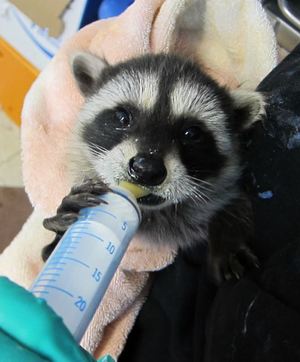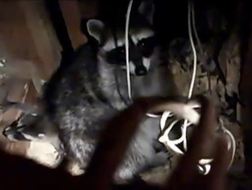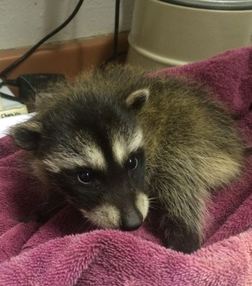WildCare's Wildlife Hospital treats nearly 4,000 ill, injured and orphaned wild animal patients from over 200 species every year. This is one family's story.
 When neighbors out for a walk heard whickering noises coming from the top of a pile of junk in a vacant lot down the street, they decided to investigate.
When neighbors out for a walk heard whickering noises coming from the top of a pile of junk in a vacant lot down the street, they decided to investigate.
Fortunately for this little raccoon and his three siblings, they did.
Raccoon baby season is in full swing. Whether someone illegally trapped and removed these babies' mother, or they just found the unaccompanied babies and decided to get rid of them, we'll never know.
But these now-orphaned raccoons were found clinging to each other atop a precarious pile of junk, and there is no way their mother would have left them in that condition.
When they arrived at WildCare, they were dehydrated, but not terribly so, and they had a small amount of milk in their bellies, indicating they hadn't been exposed and alone too long.
 Every day this time of year, WildCare's Living with Wildlife Hotline and our WildCare Solutions service receive calls about raccoons denning under people's homes or in their attics.
Every day this time of year, WildCare's Living with Wildlife Hotline and our WildCare Solutions service receive calls about raccoons denning under people's homes or in their attics.
Most people think that a raccoon family that has moved in is here to stay, but in fact, Mama Raccoon and babies will leave together once the babies are old enough.
We do everything we can to encourage homeowners to wait, usually only a few weeks, for the young raccoon family to grow up and leave the den site. Then entry points may be safely sealed up (we recommend using a professional service like our WildCare Solutions) to prevent unwanted wildlife neighbors from coming back.
Whoever found these four baby raccoons obviously didn't know that, and instead orphaned these little babies and left them to die in an empty junk lot.
Fortunately, they were found before it was too late.
 Upon arrival at WildCare, they were immediately given a full physical. Each baby had his or her eyes and ears checked, and their mouths were examined to check hydration.
Upon arrival at WildCare, they were immediately given a full physical. Each baby had his or her eyes and ears checked, and their mouths were examined to check hydration.
The babies had been exposed to the afternoon sun and were somewhat dehydrated, but overall they were in good shape. Medical Staff gave them subcutaneous fluids, and then introduced them to the specialized baby formula that will replace their mother's milk while they are in our care.
They went into care with a Raccoon Foster Care specialist, where they are being fed this specialized formula at regular intervals.
As human mothers do, these babies' Foster Care mother started introducing them to solid foods to not only prepare them for the things they'll eat as adults, but also to keep their bellies full longer and extend the time between feedings of formula.
Two of the first solid things an orphaned baby raccoon in Foster Care tries are custard made from egg and the familiar-tasting milk formula, and soft-ripened persimmons defrosted from last autumn. Baby raccoons love persimmons!
Watch in the video below as this little orphan tries his custard and fruit. Be sure to turn up your sound, the slurping is the best part!
During their stay at WildCare, we will feed these rambunctious raccoons a varied diet and introduced them to a wide range of the foods they'll find in the wild.
For about $3.43 per day these babies will grow up healthy and gain weight on fruit, fish and the other items that you see in the menu box on the right.
These four orphans will stay with us for more than three months before they will be ready to return to the wild. That means feeding this quartet will cost at least $1,234.80 during their stay at WildCare, and WildCare treats over 100 raccoons each year!
Learn more on how to alleviate their food bill (and feed the dozens of baby raccoons we'll foster at WildCare this summer!) at WildCare.org.
WildCare is a 501(c)3 nonprofit organization supported almost entirely by private donations and individual memberships. Visit us online at wildcarebayarea.org.
Our 2024 Coverage Needs You
It's Another Trump-Biden Showdown — And We Need Your Help
The Future Of Democracy Is At Stake
Our 2024 Coverage Needs You
Your Loyalty Means The World To Us
As Americans head to the polls in 2024, the very future of our country is at stake. At HuffPost, we believe that a free press is critical to creating well-informed voters. That's why our journalism is free for everyone, even though other newsrooms retreat behind expensive paywalls.
Our journalists will continue to cover the twists and turns during this historic presidential election. With your help, we'll bring you hard-hitting investigations, well-researched analysis and timely takes you can't find elsewhere. Reporting in this current political climate is a responsibility we do not take lightly, and we thank you for your support.
Contribute as little as $2 to keep our news free for all.
Can't afford to donate? Support HuffPost by creating a free account and log in while you read.
The 2024 election is heating up, and women's rights, health care, voting rights, and the very future of democracy are all at stake. Donald Trump will face Joe Biden in the most consequential vote of our time. And HuffPost will be there, covering every twist and turn. America's future hangs in the balance. Would you consider contributing to support our journalism and keep it free for all during this critical season?
HuffPost believes news should be accessible to everyone, regardless of their ability to pay for it. We rely on readers like you to help fund our work. Any contribution you can make — even as little as $2 — goes directly toward supporting the impactful journalism that we will continue to produce this year. Thank you for being part of our story.
Can't afford to donate? Support HuffPost by creating a free account and log in while you read.
It's official: Donald Trump will face Joe Biden this fall in the presidential election. As we face the most consequential presidential election of our time, HuffPost is committed to bringing you up-to-date, accurate news about the 2024 race. While other outlets have retreated behind paywalls, you can trust our news will stay free.
But we can't do it without your help. Reader funding is one of the key ways we support our newsroom. Would you consider making a donation to help fund our news during this critical time? Your contributions are vital to supporting a free press.
Contribute as little as $2 to keep our journalism free and accessible to all.
Can't afford to donate? Support HuffPost by creating a free account and log in while you read.
As Americans head to the polls in 2024, the very future of our country is at stake. At HuffPost, we believe that a free press is critical to creating well-informed voters. That's why our journalism is free for everyone, even though other newsrooms retreat behind expensive paywalls.
Our journalists will continue to cover the twists and turns during this historic presidential election. With your help, we'll bring you hard-hitting investigations, well-researched analysis and timely takes you can't find elsewhere. Reporting in this current political climate is a responsibility we do not take lightly, and we thank you for your support.
Contribute as little as $2 to keep our news free for all.
Can't afford to donate? Support HuffPost by creating a free account and log in while you read.
Dear HuffPost Reader
Thank you for your past contribution to HuffPost. We are sincerely grateful for readers like you who help us ensure that we can keep our journalism free for everyone.
The stakes are high this year, and our 2024 coverage could use continued support. Would you consider becoming a regular HuffPost contributor?
Dear HuffPost Reader
Thank you for your past contribution to HuffPost. We are sincerely grateful for readers like you who help us ensure that we can keep our journalism free for everyone.
The stakes are high this year, and our 2024 coverage could use continued support. If circumstances have changed since you last contributed, we hope you'll consider contributing to HuffPost once more.
Already contributed? Log in to hide these messages.



